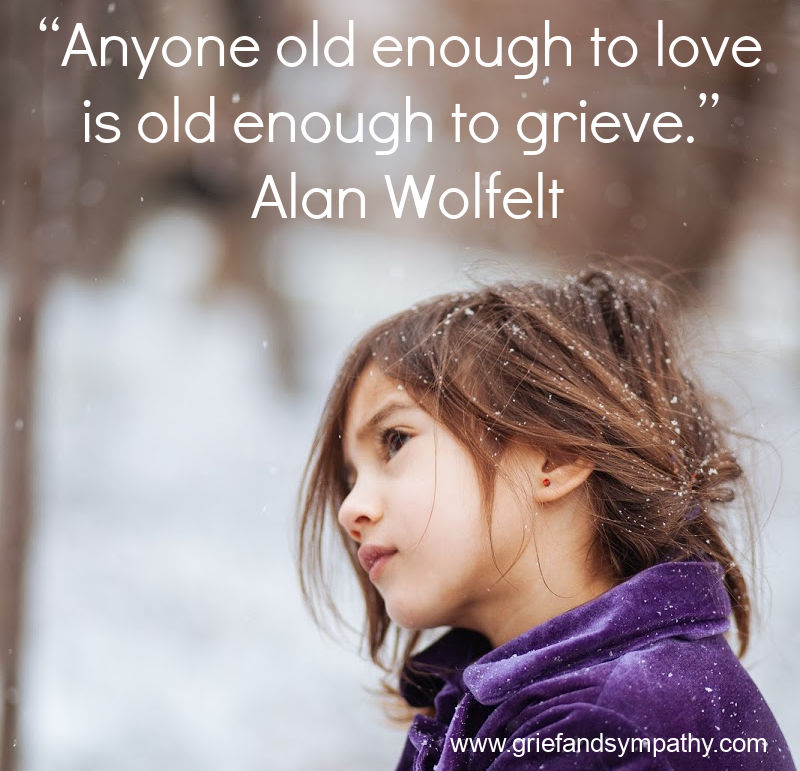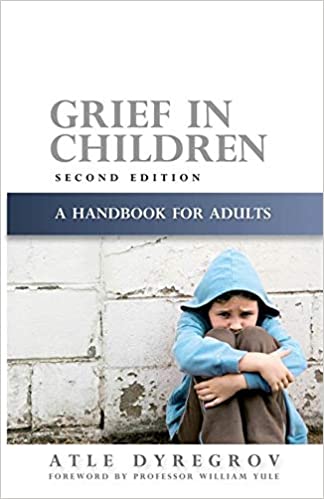How Children Process Grief
By Stanislava Puač Jovanović – Psychologist, Life Coach, Freelance Writer in the Psychology Field
Facing the loss of a loved one shakes everyone’s comprehension of the world and their emotional footings. However, children process grief differently compared to adults. The main distinction is not merely in their feelings and life experience. It is also in their thinking - their ability to grasp what has happened.
 “Anyone old enough to love is old enough to grieve.” Alan Wolfelt
“Anyone old enough to love is old enough to grieve.” Alan WolfeltAdults’ Mistaken Belief about how Children Grieve
Adults, even experienced professionals, are often at a loss when they need to help a child deal with bereavement. Many adults believe (and hope) that young children don’t think about, understand or mourn the death of a loved one. This is simply not true. Children feel the loss and will remember it.
Children do take in the fact of death differently, as we will explain in the next section of this article. However, they still are aware that something momentous has happened. The same as with any trauma, a child needs to work through the grieving process gradually. Incorporating this new reality into their understanding of the world takes time and a lot of honest and gentle support.
A child’s perceptiveness is also at work here. Adults might be mistaken in thinking that a child doesn’t pick up on their responses and conversations about the event. Children will observe how adults react, absorb every word they hear - and interpret it to the best of their abilities.
Some adults believe that children cope with grief more easily because they don’t fathom death. Some parents try and help their children by keeping them entertained. People often hope that if children are kept busy and are not reminded about their loved one passing away, they will forget about it. However, a child will still be grieving. Whether they are on an amusement park ride, at school or a soccer game, they are processing grief all the time.
How Children Understand Death
If you want to understand how children process grief, you need to be aware of the developmental phases of a child’s thinking abilities. Although the death of a loved one is indisputably a very tangible fact, the concept of death is abstract. This makes it difficult for a mind that is still not fully developed to comprehend all that stems from the actuality that someone has died.
Below we describe some of the signs of grief in children and how children of different ages make sense of death, according to works of one of the most significant researchers of cognitive development, Jean Piaget, and his successors.
Although the following descriptions apply to most children, there are always individual differences based on many factors. Some children enter the described stages earlier, some later. Always approach a child as an individual and assess their reactions and abilities at any given moment.
Babies and toddlers (0-2 years of age)
Although a baby’s cognitive and verbal skills are still undeveloped, they, the same as toddlers, will experience death as separation. Research has demonstrated over and over again that this can result in life-long consequences such as more health issues, problems with forming healthy relationships, becoming prone to emotional disturbances such as depression and anxiety, or low self-acceptance.
A recent study experimentally confirmed that such an event might cause vulnerability to many psychiatric disorders in adulthood. This is why it is crucial not to disregard the small children’s need for stability. Try to maintain it during the grieving process.
Very young children need the security of a routine and known people. When a loved one dies, their lives are usually severely disrupted by the change. As a consequence, their sense of safety, and the fulfilment of their physical and psychological needs might be jeopardised. Babies and toddlers might become highly irritable, distressed, and change their eating and sleeping patterns.
Preschoolers (2-7 years of age)
Preschoolers are, according to Piaget, at a stage of intellectual development that makes it impossible for them to grasp the irreversibility of death. They see it as something temporary. Similar to a play of peek-a-boo, they expect that the loved one will eventually re-appear. It is not unusual to hear questions such as: “I know grandpa is dead - but is he coming to dinner?” or “Is mom going to come and tuck me in? And tomorrow?”
Guilt often follows each time the deceased person doesn’t come back. A child of this age is still egocentric in their thinking. So, they feel that it must have been something they did that caused the passing of their loved one.
Because preschoolers live predominantly in the present, their emotional reactions can be extremely intense, but relatively brief. They might also become anxious or regress to previous stages of development. It means they might start wetting their bed again or act clingy and have temper tantrums.
Primary school-aged children (7-11 years of age)
At this moment, children move on to the next stage of intellectual development, which means that they still operate in concrete terms. They need to see things or imagine something tangible to be able to take in a concept or a rule.
They begin to understand that all living things die, that death is irreversible and universal. But, they still expect that there are ways to ensure that it won’t happen to them or their close ones. For example, they might think that only old and ill people die.
At this age, children will ask candid questions about death and what happens to the body afterwards. Emotionally, they might become angry and start acting out. Alternatively, you might see a profound sadness in them and an inability to focus at school. They commonly fantasise about how they could have prevented their loved one’s passing - especially when it doesn’t fit their expectations about when and to whom death happens.
Children over the age of 11
Roughly at this age, a child reaches the ability to think in abstract concepts. They begin to grasp death similarly to how adults think of it. They now understand that death is an intrinsic part of life. The inevitability of death is now apparent.
Although they can think as adults do, children of this age are still emotionally relatively immature. They also have less life experience to work with when dealing with stress and trauma. Therefore, they might not have an arsenal of healthy coping skills to help them process grief.
They could seek to hide their grief or mask it. It is common to see angry outbursts or physical symptoms in a grieving child of this age. Teens could start engaging in risky behaviours and become defiant. Getting support from their peers, rather than their family members, becomes increasingly important.
How to Help a Child Process Grief
Every child is an individual. However, all children, without exception, need a lot of warmth, love, and sincerity. At any stage, a child will cope with loss better when they feel that there is still someone they can rely on. Be emotionally accessible. And, be gently open in communicating the new reality of a life without the departed.
Therefore, to buffer the impact of the loss, make sure that as much of the child’s routine as possible is maintained. Prepare to be there for them at any moment, and respond to their questions and feelings over and over again. If you want to read more about concrete steps and advice on how to help children cope with grief, click here.
Helping children with grief isn’t always easy. If you need more professional help, we have partnered with Betterhelp who provide excellent grief counseling for children online. You can read more about them below.
Recommended Read:
Related Pages:
Helping Children Cope with Grief
Talking to Children about Death
References
Hailey Maier, E., & Lachman, M. E. (2000). Consequences of early parental loss and separation for health and well-being in midlife. International Journal of Behavioral Development, 24(2), 183-189.DOI: 10.1080/016502500383304
Harrison, S. I., Davenport, C. W., & McDermott, J. F. (1967). Children’s reactions to bereavement: Adult confusions and misperceptions. Archives of General Psychiatry, 17(5), 593-597.doi:10.1001/archpsyc.1967.01730290081010
Wolfelt, A. (2013). Helping children cope with grief. London, UK: Routledge.
Where to get help:
Have You Considered One-on-One Online Grief Counseling?
Get Expert and Effective Help in the Comfort of Your Own Home
The following information about online counseling is sponsored by 'Betterhelp' but all the opinions are our own. To be upfront, we do receive a commission when you sign up with 'Betterhelp', but we have total faith in their expertise and would never recommend something we didn't completely approve.
Do you feel alone and sad with no support and no idea how to move forward? It can be tough when you are stuck in grief to find the motivation to get the most out of your precious life.
Online counseling can help by giving you that support so you don't feel so alone. You can have someone to talk to anytime you like, a kind and understanding person who will help you to find meaning in life again, to treasure the memories of your loved one without being overwhelmed and to enjoy your activities, family and friends again.
- Simply fill out the online questionnaire and you will be assigned the expert grief counselor most suitable for you. It only takes a few minutes and you don't even have to use your name.
- Pay an affordable FLAT FEE FOR UNLIMITED SESSIONS.
- Contact your counselor whenever you like by chat, messaging, video or phone.
- You can change counselor at any time if you wish.
- Click here to find out more and get started immediately.
- Or read more about how online counseling works here.
Sales from our pages result in a small commission to us which helps us to continue our work supporting the grieving.
Hypnosis for Grief - 10 Ways It Can Help You
Try a gentle hypnotherapy track to relax the mind. Learn how self-hypnosis can help you cope with grief at any time of the day or night.

For Remembrance:
Sales from our pages result in a small commission to us which helps us to continue our work supporting the grieving.
Memorial Jewelry to Honour a Loved One
Check out our lovely range of memorial jewelry for any lost loved one. Pendants, necklaces, rings or bracelets, we have them all in all kinds of styles. Choose for yourself or buy as a sympathy gift.
Create an Online Memorial Website
Honour your loved one with their own memorial website. Share photos, videos, memories and more with your family and friends in a permanent online website. Free for basic plan with no ads.
- Grief and Sympathy Home
- Helping Children Cope with Grief
- How Children Process Grief









